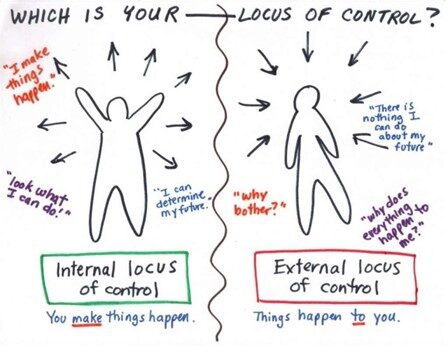We’ve all worked with people who, when things go wrong, blame everyone and everything except themselves. “The expectations were too high.” “I wasn’t given enough time (or resources or guidance or margin) to complete the project.” The excuses are endless, so they go on and on about why it’s not their fault that they underachieved. On the other hand, I know we’ve all worked with someone else who takes 100% responsibility for whatever happens to them—good or bad. No excuses. The buck stops with them.
How you view an outcome—and your role in it—is called the “locus of control.”
Locus of control refers to the extent to which people feel that they have control over the events that influence their lives. Simply put: Do you believe that your success (or life or destiny) is controlled by you or by external forces (such as the economy, fate, luck or powerful others)?
The concept was developed by Julian Rotter in 1954. There are two main types of loci of control, which together dictate how much people believe they are in control of their lives. Internal locus of control defines control within one’s own efforts. External locus of control sees power coming from external forces.
Let’s take an example. A vice president of sales gets a negative performance review from the company’s president. How this VP processes the poor performance review depends upon her locus of control. A VP with a strong internal locus of control would accept the fact that she didn’t meet sales or profit goals for the year. This person would consider how she might have done a better job of driving sales at better margins. She might think about who on the team needs training and what type of training is needed. And this VP would use the review as a motivator for becoming a better leader for the sales team. Maybe she would think: “We have the right team and better products than our competition. I think I just took my eye off the ball and got distracted. We need to be in front of clients and new relationships more.”
If the vice president of sales has a strong external locus of control, he will blame the economy, Covid, inflation, a difficult job market, the competition (or all these things) for falling short of the expected goals. He might say, “Our prices are too high and not in line with the competition. Our core issue is not sales. This is a production problem or a marketing problem.”
I think at work, and in the game of life, our success is not based on beating others. Our greatest competition takes place between our ears. And it is a fight we fight in our minds every day.
I read that, on average, 80% of repeated thoughts are negative ones. Does that describe you? If you are wired to have a strong external locus of control, work at changing your outlook and thought processes. Do not be a victim at work or in life. Instead of playing a blame game, develop an attitude of “If it’s meant to be, it’s up to me.”
Take responsibility for what happens to you. Be the change you want to see and take control of your own life.
“You are not in competition with anyone other than your previous selves. It has always been You vs. You.” ~ The Daily Coach
